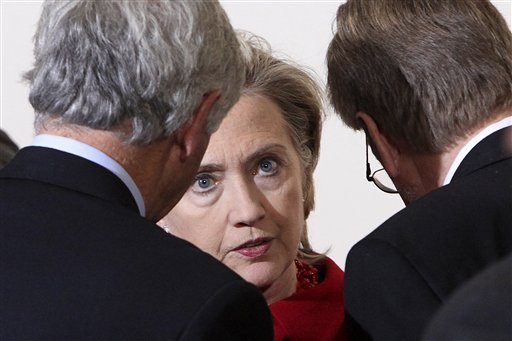
More Reboot or a Real Strategic Overload?
Publication: Eurasia Daily Monitor Volume: 6 Issue: 229
By:

On December 1, after lengthy consultations with his military and political advisors, President Barrack Obama announced an increase of 30,000 US troops for Afghanistan and sent his Secretary of State, Hillary Clinton, to Brussels to help secure an additional 10,000 troops from other NATO members. Russian responses were quite rapid and reflected different perspectives among the national security elite. In particular, three responses were devoted to US-Russian relations, Afghanistan and the geopolitical situation in Central Asia. Comments made by such an elite are important for two reasons. One is geopolitical: the size of the force that Washington and Brussels now seek to deploy in Afghanistan cannot be sustained logistically using the route via Pakistan. That means that Russia and the Central Asian states will have a major role in the transit of supplies in the absence of alternative routes through Eurasia. Additionally, the two authors of the three pieces are influential within the Russian foreign and defense policy elite. Their contrasting views suggest different perspectives, but common conclusions on how Russia should respond in the short-term.
The Rector of the Moscow State Institute of International Relations, Academician Anatoly Torkunov, defined the new strategy as a khitraia perezagruzka (clear reset) a reference to the initiative by Hillary Clinton to “reboot” US-Russian relations after the crisis associated with Russian military intervention into Georgia. Torkunov characterizes US policy as a reduction in anti-Russian rhetoric without any fundamental shift in hostility toward Russian interests. He points to the fact that over the last two decades Russian presidents (Yeltsin and Putin) both began their administrations with hopes of creating a strategic partnership where US-Russian cooperation would be based upon Washington’s “respect” for Russian interests in the post-Soviet space. Both watched their policies in this area fail. The Obama administration has cooled the rhetoric of confrontation that followed the Russia-Georgian War. In place of bellicose attacks, Washington now speaks the language of “smart power,” which he categorizes as the judicious application of soft and hard power and cooperation based on mutual interests (Izvestiya, December 3).
Torkunov states flatly that the US needs Russian cooperation to resolve a number of key foreign policy issues. “These include the reduction of nuclear arsenals and non-proliferation of weapons of mass destruction, as well as the situation in Afghanistan. Washington has demonstrated the confidence that it can handle it [Afghanistan], but has the thought that support or at least the absence of interference from Russia does not hurt.” Torkunov credits the Obama administration with a pragmatic policy in the face of domestic opponents who do view Russia as a serious threat to the stability of Eurasia. Obama’s pragmatism has meant that the hard issues between Russia and the US have not been addressed, and here Torkunov puts the questions of NATO expansion, the security architecture for Europe and the fate of the CFE Treaty. The real limits of US-Russian cooperation will be revealed by the specific Russian content contained in the Pentagon’s Quadrennial Defense Review and the upcoming Nuclear Policy Review. Obama’s current strategy in Afghanistan depends upon Russian cooperation, but it does not represent a strategic partnership at this stage. Torkunov leaves the future of US-Russian relations open-ended, suggesting that both Moscow and Washington are being pragmatic without addressing the hard issues (Izvestiya, December 3).
Army-General Makhmut Gareev, the President of the Academy of Military Sciences and a leading Russian military expert on Afghanistan, likes the original term used by the State Department to describe the new start proposed by the Obama administration. In a mistranslation from the English, the State Department used peregruzka (overload), the term most associated with the warning that an elevator is carrying too much weight. The general sees current US strategy toward Russia as overloaded with hostility towards any legitimate Russian sphere of influence in Eurasia and states that the continued US-Russian confrontation is at the very root of Obama’s new strategy towards Afghanistan, which he describes in geopolitical terms as both an attempt to bring new energy regions under US hegemony and to remove Russian influence from Central Asia and complete the encirclement of the Russia state. He hints vaguely that some dark forces in the United States had a hand in 9/11. Gareev states that the evidence of international cooperation to provide stability in Afghanistan after 2001 was little more than a “camouflaged transfer of control of Afghanistan to the United States and NATO.” What has happened since was the inevitable emergence of the traditional hostility of the Afghan population, especially the Pashtuns, to foreign occupiers and their client government in Kabul (Voenno Promyshlennyi Kuryer, December 2).
US success in Afghanistan foundered with the revival of the Taliban and the fighting spreading to Pakistan. Obama’s policy is to co-opt Russia into supporting an American presence in Afghanistan, while doing nothing to halt the drug trade that threatens Russian society and the spread of Islamic extremism that undermines the security of the Central Asian states. Gareev suggests that the Russian government has been duped by US misinformation.
Just two days later, Gareev published a second article displaying the same anti-US and anti-NATO rhetoric. But the title recommended caution: “Do not Provoke a Confrontation with the West and Strengthen the CIS.” He defined the objectives of US policy as hostile to Russian interests: “The implication is that the main goal of the United States and other NATO countries is to create in Afghanistan and Pakistan a springboard for further penetration and establish its influence over the entire Central Asian region with its abundant energy resources and the blocking of Russia and China.” To counter this threat and others he champions retaining nuclear capabilities, but also including the modernization of Russia’s conventional forces (Nezavisimoe Voennoe Obozrenie, December 4).
That Gareev’s two articles should be published at the very time of Obama’s address on Afghanistan appears to be no accident. Gareev’s answer to the initiative is to support tactical cooperation to avoid a confrontation with the West, while Russia seeks to strengthen its own defenses and its geopolitical position in Central Asia for a coming confrontation with the United States and NATO. He seems to be betting that Obama’s strategy will not weaken the Taliban or provide a stable Afghan government in the anticipated timeframe which will force strategic recalculation in Washington –and Russia should be preparing for that eventuality.




